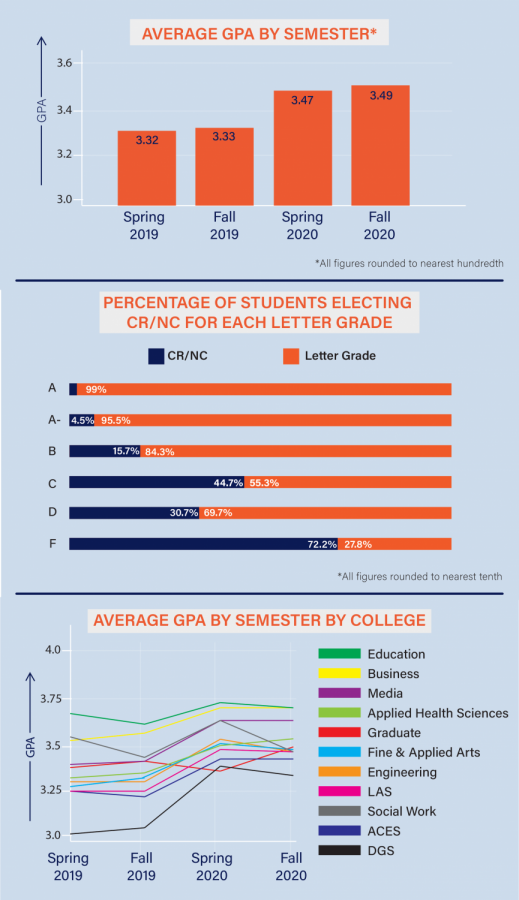COVID-19 grade options result in boosted GPAs across University
February 4, 2021
The extension of Credit/No Credit deadlines for the past two semesters has resulted in unprecedented GPA increases in colleges across the University.
According to University data obtained by The Daily Illini, the average GPA across the University for the Fall 2020 semester was 3.50, compared to an average of 3.33 in Fall 2019. For Spring 2020, the average semester GPA was 3.47 compared to an average of 3.32 in Spring 2019.
Because of hardships placed on students by the COVID-19 pandemic, the University chose to extend CR/NC and drop deadlines for both the Spring and Fall semesters of 2020.
In Spring 2020, students were allowed to drop a course or elect CR/NC until May 6 — the last day of instruction. For Fall 2020, the University’s first fully hybrid semester, the drop deadline was extended to Dec. 18, the last day of finals, and the CR/NC deadline was extended to Jan. 5 — after semester grades were released.
When a student elects CR/NC for a certain course, they receive credit for that course without their grade counting towards their GPA. Courses in the College of Law, Carle Illinois College of Medicine and the College of Veterinary Medicine are not included in the academic policy modifications and therefore were excluded from data presented in this story. Grade information from the School of Information Sciences was only provided for Fall 2020 and is not included in any comparative data.
Get The Daily Illini in your inbox!
Many students took advantage of the extended deadlines. In Spring 2020, 11,722 students, 25.24% of the student body, elected the CR/NC option for at least one class. Fewer students elected the option for Fall 2020, with 8,869 students, 17.70% of the student body, earning CR/NC for at least one class.
One factor contributing to GPA inflation is the ability to select which courses to enact CR/NC on based on the student’s expected grade. Students earning low grades in some of their classes were more likely to elect CR/NC for that particular class, presumably to help boost their GPA.
Of all students who earned a C in one of their classes, 43.38% elected to enact CR/NC. For students who earned an F in one of their classes, only 49.35% elected to enact CR/NC. Those who earned higher grades were less likely to elect CR/NC, as to have their grade count towards their GPA — only 8.26% of students who earned an A- elected the CR/NC option.
The degree of GPA inflation during the past two semesters varied from college to college. GPA inflation was most prominent in the Division of General Studies, where the average GPA increased 3.04 in Spring 2019 to 3.41 in Spring 2020 — a 12% increase. This phenomenon was also highly prevalent in the Gies College of Business, where the Fall 2020 average GPA was 3.72 compared to the Fall 2019 average of 3.55 — an increase of almost 5%.
“The simple fact that we will have a record number of students on the Dean’s List and also Bronze Tablet tells you that GPA is going to mean something different during COVID than it did before,” said Kevin Pitts, vice provost for undergraduate education.
Pitts stated the CR/NC policy was modified in part to help alleviate student stress during an already overbearing semester. He said that graduate schools and employers will take COVID-related factors into account, although he’s not sure what that will look like.
“Our original goal with academic policy modifications was to ensure that struggling students weren’t penalized too heavily if they didn’t do well in a class due to the pandemic, online learning and all of the associated challenges,” Pitts said. “I think one unfortunate side effect of the very broad grading policy modifications is a reinforcement of the concept that grades and GPA are super important. There is no doubt that employers and graduate schools will take the circumstances related to COVID into account, but we don’t know exactly what that will mean.”
Dean’s List eligibility is limited to the top 20% of each college’s class determined by that semester’s GPA. However, more than 20% of a college’s students can be included on the Dean’s List if a large number of students earn the same semester GPA, possibly due to the limited number of grade permutations.
The reduction in the number of letter grades has resulted in less variation in a given class’s grade distribution, leading to an increase in the number of students listed on their respective Dean’s Lists. Fall 2020 saw an average of 35.16% of a college’s student body make the Dean’s List, compared to an average of 22.34% in Fall 2019.
This increase was most drastic in the College of Media, where 40.53% of the student body earned Dean’s List honors in Fall 2020, compared to 19.04% in Fall 2019, a difference of 21.49%. Every college across campus saw an increase in the percentage of its students named on their respective Dean’s Lists.
The UI Senate is currently considering grading policy modifications for the Spring Semester, including the possible implementation of a new “Pass COVID/No Pass COVID” grade, which would allow students to elect credit options for classes where they received a D or D- as well.







